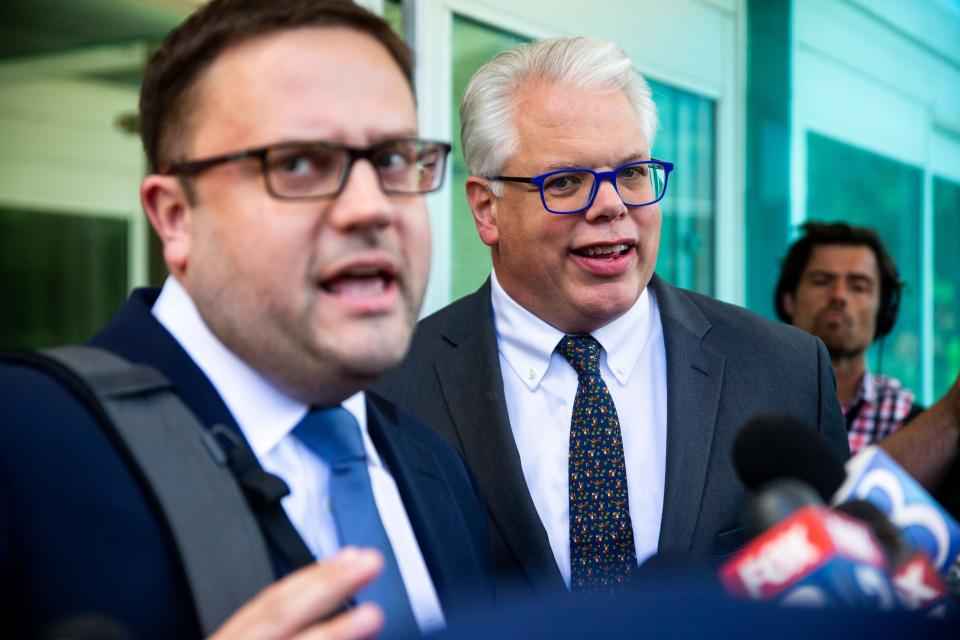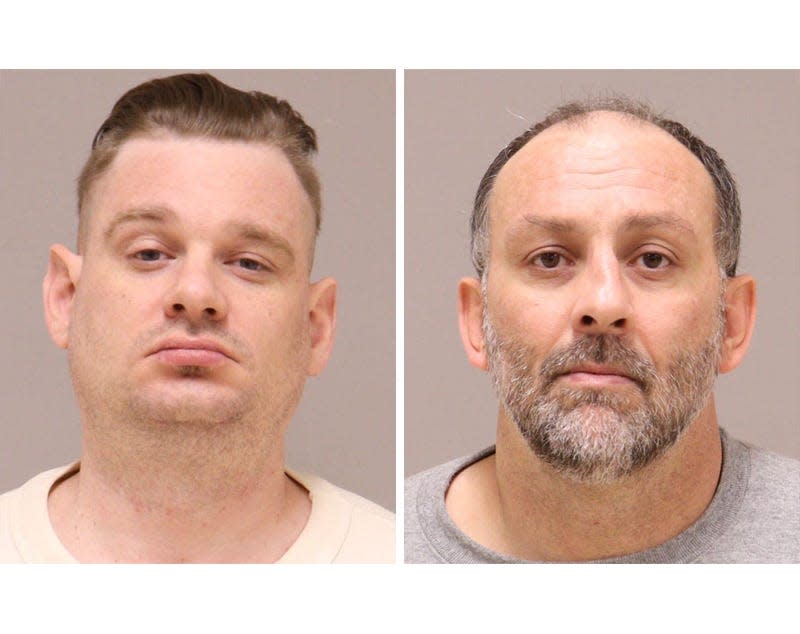Judge unseals documents about alleged rogue juror in Whitmer kidnap trial
Hours after a federal jury convicted two men of plotting to kidnap Gov. Gretchen Whitmer, the judge unsealed court documents about a potential rogue juror who raised red flags for the defense.
According to the unsealed filing, the defense asked the judge in the first week of trial to dismiss the juror after learning that the person had allegedly told co-workers that if picked to be on the jury, they "would make sure that the defendants were found guilty."
U.S. District Judge Robert Jonker, however, denied the defense's request to dismiss the juror after interviewing the person, concluding the person was not biased, nor dishonest.

How the juror allegation played out
"The Court is eminently satisfied that the present record does not provide a basis for removing the subject juror for bias," Jonker wrote.
"During the interview, the court squarely presented the report of the subject juror’s alleged statements. The Juror repeatedly and consistently denied making any such statements," Jonker wrote. "Based on the Court’s observation of the juror’s demeanor and behavior, these responses were credible. They are also consistent with the juror’s statements during voir dire — that the juror could put aside any preconceived views and decide the case based just on the evidence and law presented — assurances the juror repeated in chambers."
Attorneys for defendants Adam Fox and Barry Croft Jr., however, did not like how it all panned out. According to the judge's unsealed order, here is what went down on the second day of trial, after the jury had already been seated:
One day after jury selection, after both sides had given opening statements, the lawyer for defendant Croft "alerted court staff to potential misconduct on the part of one of the jurors in this case. No other information was given at that time," the judge's order states.
More: Jury convicts Adam Fox, Barry Croft Jr. in Whitmer kidnapping plot
More: How 3 controversial jurors wound up in the Whitmer kidnap jury box

However, defense attorney Joshua Blanchard noted that the court may want to "deal with the issue in a non-public way to limit the risk of publicity that could affect the fairness of the process as it unfolds," the judge wrote.
The next day, Blanchard disclosed to the judge that his office had received more information about the juror from one of the juror's co-workers.
According to the judge's order, sometime before the trial began, the juror told a co-worker about a summons for federal juror duty, and that the person hoped to get picked for the upcoming Whitmer kidnapping trial.
"According to the report, the subject juror expressed a strong opinion about the defendants’ guilt and indicated that if chosen, he or she would make sure that the defendants were found guilty," the order states, adding the tipster corroborated some of the information for the defense lawyer, who then shared the information with the court.
The tip wasn't firsthand information
The judge wrote that initially, he interpreted the tip as coming from an individual "reporting a direct, firsthand conversation with the juror," though he would later learn that this was all a secondhand report.
The trial resumed the following day, with the potentially problematic juror still in the box.
The juror's identity has not been released.
The court conducted an investigation and the jury clerk followed up with the individual who had called Blanchard, while the case proceeded in the ordinary course.
"It would have needlessly wasted the time of the jury, the witnesses, and the parties to delay trial under the circumstances," the judge wrote in his order. "Notably, the jury clerk learned the reporting coworker had not directly spoken with the subject juror or heard anything from the juror. Rather the information the reporting coworker provided had come secondhand through another coworker of both the reporting individual and the subject Juror."
The reporting co-worker had no direct contact with the juror or about the "juror's feelings about this case, jury service or anything about the instant matter. He did not even know for sure if the subject juror was serving on this case. The caller was simply reporting a secondhand report from someone else about what that other person reportedly heard from the subject juror," the judge wrote.
Defense objected to the judge's approach
Moreover, the judge continued, the jury clerk "was unable to confirm the report with the other coworker because that coworker had reportedly expressed a desire not to speak or otherwise be identified, and the person who did call refused to identify the person."
The jury clerk did, however, confirm that the incident occurred before jury selection.The judge disclosed the jury clerk’s findings to both sides and said he would speak with the juror at the conclusion of trial day, and give the parties a chance to review an unofficial transcript of the conversation.
The prosecution agreed with this approach, but the defense objected to not being present during the conversation with the juror.
"Attorney Blanchard also expressed a concern that the subject Juror was somehow manipulating the jury during trial to ensure an allegedly desired outcome," Jonker wrote, adding Blanchard asked that the whole jury be questioned on the matter with the parties present, or that the court declare a mistrial.
The judge denied the request.
More: Acquitted Whitmer kidnap defendant won't risk his freedom to help the others at retrial
More: Judge scolds defense in Whitmer kidnap trial: Stop wasting time talking 'crap'
That evening, Blanchard filed a “Brief Regarding Possible Juror Issue, maintaining the defense was entitled to an evidentiary hearing on the matter, arguing this was a constitutional right of the defendants. The brief was initially filed on the public court docket, though Jonker ordered it sealed and prohibited both sides from discussing any matters involving the jury.
The Free Press obtained a copy of the filing before it was sealed, and has reported on the potentially problematic juror.
The next day, the judge interviewed the juror in his chambers. It was Aug. 12, and only court personnel were present, with Jonker concluding the defense's argument that it needed to be present during the questioning was "not convincing."
Jonker wrote in his order that the juror did not have any impact on the other jurors.

Judge sought to avoid suspicion among jurors
"There has been no information at all to suggest that the subject juror is somehow tainting the jury process," Jonker writes. "There is nothing in the report, either as relayed by Attorney Blanchard or to the jury clerk, that addresses the issue at all."
Jonker also explained why he denied Blanchard's request to interview all the jurors about the issue.
"Asking every juror whether a particular juror in the box was breaking the rules — in the absence of any information at all suggesting that — would needlessly plant suspicion and create the risk of dissension, potentially making it impossible to continue with the group as empaneled," Jonker wrote in his order.
A likely factor in appeals
The role of the potentially problematic juror is likely to play into the appellate process. The defense has said it will "most certainly" appeal the verdicts, noting several controversies occurred during the trial.
This juror was just one of them, though Jonker stressed in his order that the juror at issue showed no bias toward one party or the other. "The juror’s behavior in the jury box is entirely inconsistent with someone who has a made a predetermined decision to find the defendants guilty," Jonker wrote. "The juror has consistently been attentive and engaged during both the government’s presentations and each defendant’s cross."
Moreover, Jonker noted, the juror "has been engaged at times when other jurors have checked out of what, in the court’s view, has sometimes been needlessly long and repetitive lines of cross-examination."
The jury Tuesday convicted Fox and Croft on all counts related to plotting to kidnap Whitmer. They face up to life in prison.
Contact Tresa Baldas: tbaldas@freepreeson.com
This article originally appeared on Detroit Free Press: Whitmer kidnap trial: Judge unseals documents on juror controversy

